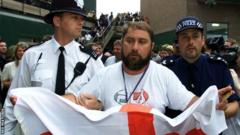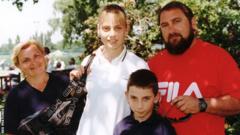Jelena Dokic: Former world number four says ‘my father put me through hell’
Jelena Dokic’s successes during her 16-year tennis career came at a heavy personal price, she says.
The Yugoslavia-born Australian was once ranked fourth in the world, and reached the semi-finals of Wimbledon in 2000, but she claims she suffered years of mental and physical abuse from her father Damir, who coached her from an early age.
Dokic has alleged she was whipped with a leather belt and kicked in the shins if she did not train well, and that she was regularly left bruised and bloodied.
Now 34 and a coach herself, she has released a book and has told BBC World Service’s Sportshour programme about name-calling, being evicted from her hotel and having suicidal thoughts.
‘I hid in the players’ lounge after Wimbledon’
Dokic had a normal relationship with her father until she started playing tennis at the age of six. Then almost immediately the verbal, emotional and physical abuse started. But despite it all, she managed to establish herself in the professional ranks and beat world number one Martina Hingis at Wimbledon in 1999, aged 16, and reached the semi-finals in 2000. She lost to Lindsay Davenport in the last four.
That should have been one of the great highlights, but after the match my father thought I was a disgrace and an embarrassment and didn’t allow me to come back to the hotel.
I had to stay at Wimbledon in the players’ lounge that afternoon and that evening and try to sleep there. I hid on a couch hoping no-one was going to find me, but the cleaners did at 11pm. The referee was called and I had to find somewhere else to sleep for the night – no money, no credit card, nothing.
‘The media thought it was funny’
Dokic’s father was banned from all women’s tour events for six months in 2000 after he became abusive in the players’ lounge during the US Open over the size of his portion of salmon. Earlier in the year, he wrapped himself in a flag of St George at Wimbledon, began shouting at spectators and smashed a journalist’s phone.
People saw what my dad was like, how he was behaving – we all know the incidents at Wimbledon, US Open, Australian Open. And based on that alone, you would think that some people would maybe come up to you and just ask you how you were doing. Just a kind word would have been enough – but it didn’t happen.
And I also didn’t understand the media, because everything that he was doing was seen as funny and a joke. The incident at Wimbledon with the flag, and the US Open. He was the punchline and a headline, but a funny one. It wasn’t funny because a 14 or 15-year-old girl was going home with this person.
Around the same time, Dokic switched allegiance from Australia to Yugoslavia (now Serbia), her father’s homeland. It resulted in a barrage of criticism from those in her adopted homeland.
That wasn’t my decision at all. I love Australia, and I was really grateful to the country for giving me what I got when I came as a refugee as an 11-year-old. I loved playing for Australia and I felt completely Australian – he took that away from me. I was only 17. I was made to do that and show that publicly which was completely not me.
‘He constantly made me feel worthless’
In the book, Dokic has told how she left home in the middle of the night with just a suitcase and her racquet bag a couple of months after signing all her earnings over to her father. She says she was prevented from speaking to her younger brother for several years – reconciling in 2008 – and considered killing herself.
It wasn’t about power, it was for me more a way out because I felt like I was letting a lot of people down. I did leave my brother behind and he was eight years younger, about 11 years old, and I had a lot of guilt and that was kind of the way my dad made me feel – he didn’t let me talk to my brother for about five years, six years, so it was very, very hard on me.
I had this guilt about whether I did the right thing and he constantly made me feel worthless, I lost a lot of confidence and self-esteem and even when I left home, he still put me through hell and really made life difficult.
I just felt everybody would be better off if I wasn’t here. All I wanted was to have a normal life and to be able to play tennis in peace.
‘I don’t speak to my father’
In 2009, Damir Dokic was jailed for threatening the Australian ambassador in Serbia with a hand grenade. The same year, Jelena Dokic returned to tennis having played only one Grand Slam between 2005 and 2008 as her ranking dropped to 621. She eventually retired in 2014. Despite her attempts, she and her dad are not in contact.
I did try to reconcile with him a few times over the years, and it just hasn’t been possible. It’s hard to communicate with someone who thinks they’ve done nothing wrong and has shown no remorse.
I’ve done absolutely everything that I possibly could have done for him and my family – when I left home I gave him all my money and continued to do so for years. But it got to a stage where it wasn’t about tennis anymore; it was about whether I was going to ever be able to live a normal life again after almost committing suicide.
I lived for almost 30 years in some kind of pain, so I think it was time to move on and look forward to the future. I’ve got a lot to be happy about and I just need to leave people behind that don’t have my best interests at heart.
Do I wish sometimes that I had a normal father and a normal family unit and support? Absolutely. But you can’t choose your parents and I’m kind of lucky to be here, luckier than most I still think.
The BBC was unable to reach Damir Dokic for a response.
Courtesy : BBC




